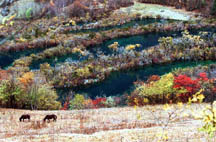| Looking Forward to an Ecological Civilization
By PAN YUE
 |
|
Throughout history, Chinese farmers have utilized ecological cultivation methods. |
Historical records show that human beings have experienced three stages of civilization. First, the primitive Stone Age, which lasted for millions of years and saw people living in groups and relying on simple labor like fishing and hunting. Next came the agricultural age, which lasted for about 10,000 years. People's ability to change nature improved dramatically with the invention of iron tools. The third stage was industrial civilization, which started in 18th-century Britain and saw the formation of modern urban lifestyles.
Three-hundred years of industrial civilization have focused on conquering nature and exploiting natural resources, but have resulted in the present global ecological crisis. Put simply, the planet cannot afford further industrial development. As a result, humankind is looking forward to a new form of civilization – an ecological society.
China was late in industrializing, but should not miss the ecological train. An environmentally friendly approach to life is deeply rooted in Chinese culture, philosophy, literature and art. For example, it was written in Lost Books of the Zhou Dynasty, a work compiled in the Warring States Period (475-221B.C.), that when spring comes, it is not proper to cut wood. In another book of the period, Ritual of Zhou, it states that tree felling is allowed only after the tree leaves fall, and that those who throw waste on the street will have their hands cut off. The punishment might seem cruel, but it shows the environmental consciousness of the ancients.
An "ecological civilization" is one in which there are harmonious relations between people, between people and nature, and between people and society, in order to realize sustainable all-round prosperity. Many Chinese belief systems also advocate harmony between man and nature. Confucianism proposes that man and nature should be integrated, as does Taoism, while Buddhism suggests that all living creatures are equal and have a right to exist. In 1988, seventy-five Nobel Prize winners gathered in Paris and came to the conclusion that if mankind is to survive, it must go back 25 centuries in time to tap the wisdom of Confucius.
|

|
|
Forest vegetation protection is the mainstay of China's homeland ecological safety system. |
To create an ecological civilization, some present ideologies must change. Western philosophy tends to put mankind at the center of things, and regards other forms of life as secondary. In a more ecologically friendly society, both humans and other life forms would be regarded as inter-dependent. Humans should respect other living creatures and their natural surroundings. An integration of humankind and nature, existing in an equal relationship, is the basis of the world's future.
In a society based on ecological values, production methods and mechanisms will also need to change. Industrial societies have until now mainly relied on production processes involving little recycling of raw materials or end products. Materialism and high-consumption lifestyles are paramount, while economic development is reliant on ever-growing consumption of resources. An ecological civilization proposes to build an environmentally friendly and sustainable society, reducing the burden on nature. As well as being beneficial to the environment, this is the most sound form of long-term economic and social development. An ecological civilization is based on thrift, consuming to meet basic needs, and the pursuit of more spiritual and cultural satisfactions.
|
